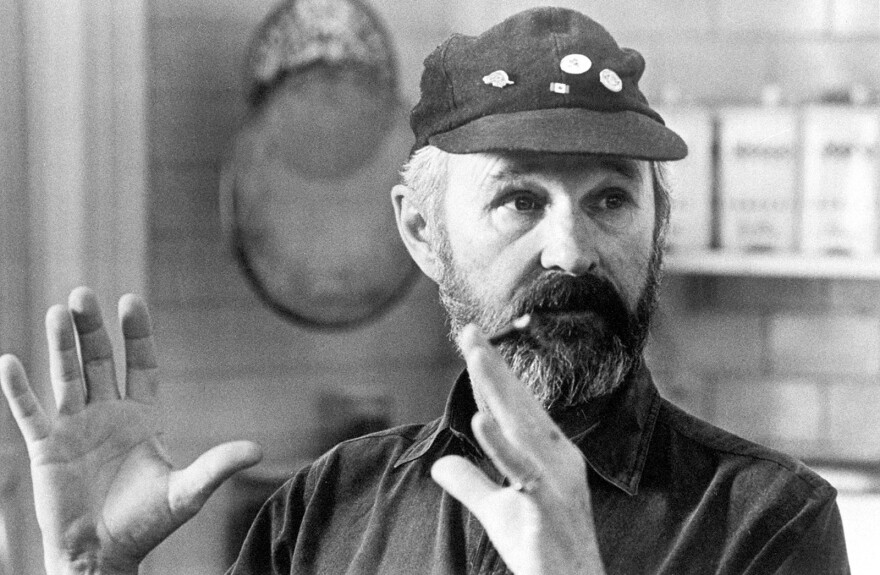This story is free to read because readers choose to support LAist. If you find value in independent local reporting, make a donation to power our newsroom today.
'Fiddler On The Roof' Director Norman Jewison Dies At 97

From the race drama In the Heat of the Night to the musical Fiddler on the Roof, Canadian-born director Norman Jewison defied categorization. He has died at the age of 97.
Jewison started his career in television. He was producing and directing a TV special when he caught the attention of actor Tony Curtis. "You do nice work, kid," Curtis recalled in his 2005 autobiography. "When are you gonna make a movie?" Not long after that encounter, Jewison directed Curtis in the 1962 comedy 40 Pounds of Trouble. Other comedies followed, with Doris Day, James Garner and Rock Hudson. Those were all studio assignments, but Jewison soon started making his own films, including 1965's The Cincinnati Kid, starring Steve McQueen, and a 1966 spoof of Cold War politics called The Russians Are Coming! The Russians Are Coming!, starring Alan Arkin.
Jewison was born in Toronto and served in the Canadian navy during World War II. As he told NPR in 2011, he was on leave toward the end of the war — only 18 years old and in uniform — when he got on a bus in Memphis, Tenn.:
"It was a hot, hot day, and I saw a window open at the back so I headed to the back of the bus. And I sat down with my bag and by the open window. The bus driver looked at me, and I could see his face in the mirror. He says, 'Are you trying to be funny, sailor?' He says, 'Can't you read the sign?' And there was a little sign and it said, 'Colored people to the rear.' "
Jewison looked around and saw that he was the only white passenger in the back. "I was just a kid, but I was kind of shocked," he said. "I thought, well, the only thing I could do is get off the bus." It was his first experience with racial prejudice and, he says, it laid the groundwork for 1967's In the Heat of the Night. That film starred Rod Steiger as small town Mississippi police chief and Sidney Poitier as a visitor to the town who is accused of murder. It won five Oscars, including Best Picture.
Film historian and critic Leonard Maltin remembers seeing In the Heat of the Night when it first came out. He says, "This film caught lightning in a bottle... By casting Poitier and Steiger as adversaries who have to work together, have to find some way to work together in a Southern town, it just set things up so perfectly for character development against a backdrop that certainly all Americans could relate to."
Jewison followed In the Heat of the Night with the 1968 hit thriller The Thomas Crown Affair, starring Steve McQueen and Faye Dunaway, but his biggest hit came in 1971 with Fiddler on the Roof. By then, Jewison had a successful track record. Still, when United Artists approached him to direct Fiddler on the Roof, it took Jewison a minute to figure out why.
"I've got a strange name," he said in his 2011 NPR interview. "Jewison. If you look at it closely, it kind of looks like I'm the son of a Jew. And I thought, Oh, my God. They think I'm Jewish. What am I going to do? Because how can you direct Fiddler on the Roof if you're not Jewish? So, I guess I have to tell them."
He got the job anyway, and the film won three Oscars. It was as different from any of Jewison's previous films as it could be. Leonard Maltin says that's what makes Jewison worth remembering.
"You can't easily pigeonhole Norman Jewison because he didn't want to be pigeonholed," Maltin says. "There is no one identifiable Norman Jewison kind of film. The same man who made [the romantic comedy] Moonstruck made Fiddler on the Roof and The Thomas Crown Affair and a couple of good Doris Day movies back in the '60s and [the World War II drama] A Soldier's Story. Those are all Norman Jewison films."
Copyright 2024 NPR. To see more, visit npr.org.







